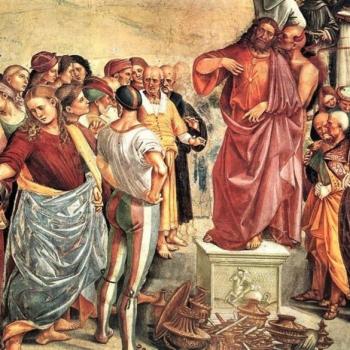Robert Tannehill points out in the second volume of his Narrative Unity of Luke-Acts that Acts 16-19 depicts a recurring “public accusation type-scene.” Prior to chapter 16, the public accusations against Paul and his associates are not highlighted. After chapter 16, they are.
“In 16:20-21 Romans accuse the mission of importing Jewish customs that undermine the customs that made Rome great. In 17: 5-7 Jews secure public support and accuse Christians before the magistrates of upsetting society and political subversion, as Christians claim that there is another king than Caesar. . . . In 18:12-13 Jews accuse Paul before the proconsul of inciting people to worship God contrary to the law. In 19:25-27 Demetrius the silversmith persuades his companions to oppose Paul on the basis of economic self-interest but also because of a threat to Artemis herself and to Ephesus’ position as cult center.”
As Tannehill points out, there is a chiastic symmetry to the opposition:
A. Philippi: Gentiles
B. Thessalonica: Jews
B’. Corinth: Jews
A’. Ephesus: Gentiles
Everyone – Jews and Gentiles – is threatened by Paul’s mission: “Jews and Gentiles view the mission as a threat to the customs that provide social cohesion, to the religious basis of their cultures, and to political stability through Caesar’s rule.”
In this context, the conversion of the Philippian jailer and Paul’s subsequent interaction with the Philippian authorities has an important place. Paul refuses to leave the jail after the earthquake, staying behind to preach the gospel to the jailer. The jailer is the most immediate representative of the very system that opposes and accuses Paul, but Paul has good news even for his persecutors. As Tannehill writes, “Paul’s attention to the welfare of another in the midst of his own suffering somewhat like Jesus’ concern for the criminal crucified beside him brings to the jailer a share in the salvation that God offers through Jesus.”
The next morning, the Philippian authorities want to put the whole embarrassing episode behind them. Paul won’t allow it, but insists on a public acknowledgement of wrongdoing: “The refusal to settle without a public act of vindication shows a concern with the public standing of the mission. Acts of ignorance and injustice must not be allowed to masquerade as truth and justice in the public eye.”
The whole sequence of events at Philippi exemplifies Paul’s supreme confidence in the gospel and in the Lord who guides his mission: “Paul and Silas, whose fortunes take a sudden turn for the worse when they are seized, accused, beaten, and imprisoned, prove to be anything but helpless victims. They pray and sing hymns to God in prison, and when the sudden possibility of freedom arises, they freely set it aside for the sake of another person, thereby advancing the gospel. They also defend the mission in the public sphere, gaining a public acknowledgment of wrongful treatment from Roman officials.”















